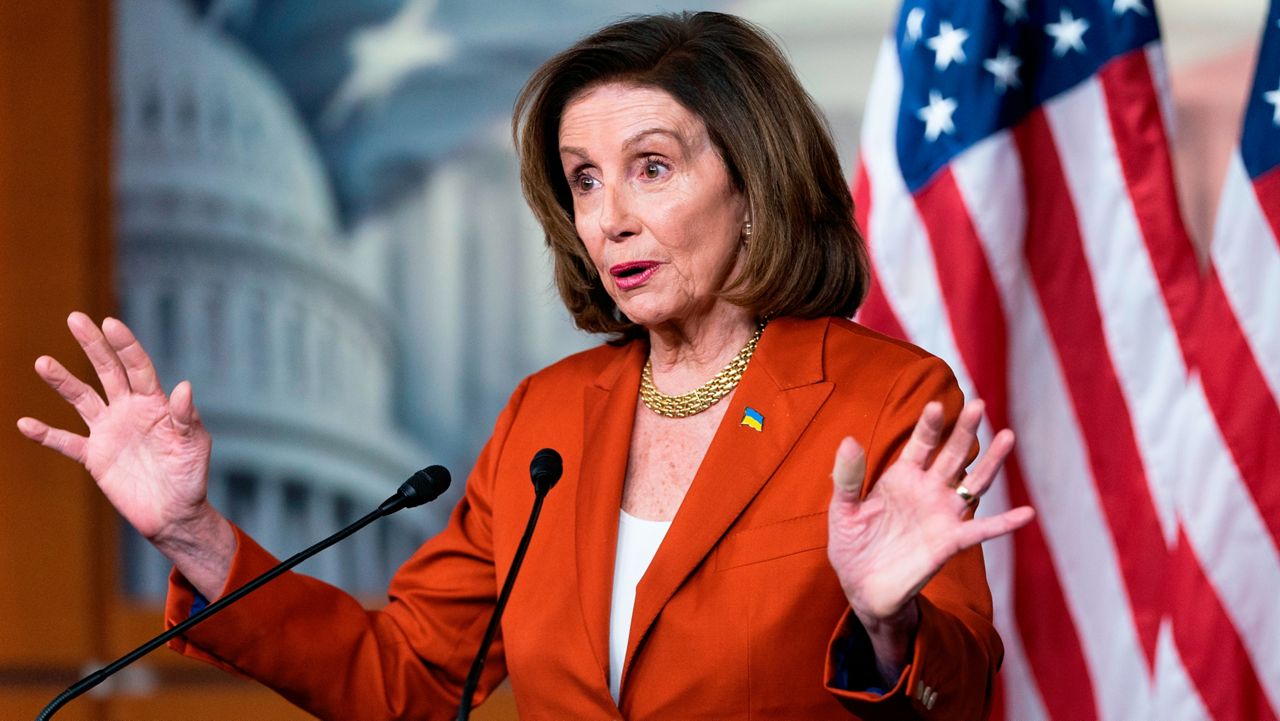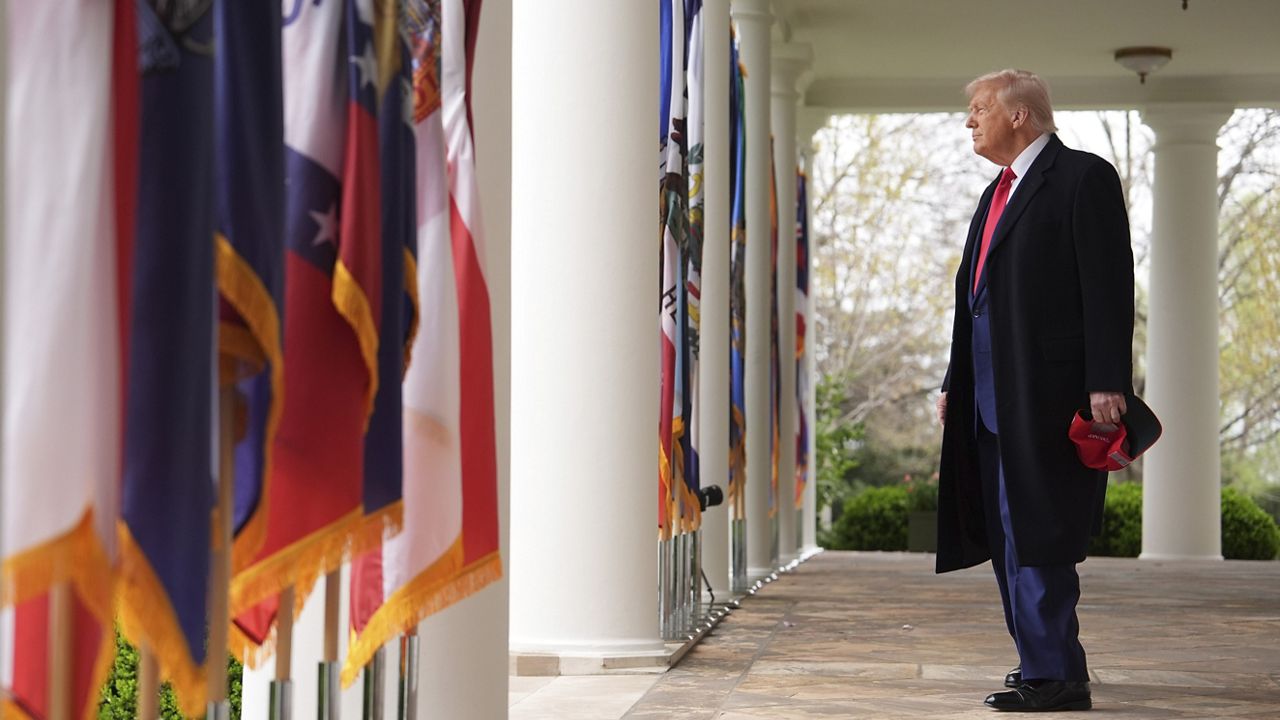A $13.6 billion emergency package of military and humanitarian aid for besieged Ukraine and its European allies easily won final congressional approval Thursday, hitching a ride on a government-wide spending bill that's five months late but loaded with political prizes for both parties.
With Russian President Vladimir Putin's invasion killing thousands and forcing over 2 million others to flee, the Senate approved the overall $1.5 trillion overall legislation by a 68-31 bipartisan margin.
Earlier, the House approved the massive spending bill in bipartisan fashion, as well as a bill codifying President Joe Biden's ban on U.S. imports of Russian oil.
The spending bill was approved in two separate votes: The security programs were approved 361-69, and the remaining spending was passed in a 260-171 vote. More Republicans joined Democrats in the former than the latter, but both received bipartisan support.
The oil ban passed in an overwhelmingly bipartisan 414-17 vote. Now both bills head to the Senate, where they are expected to pass and reach President Joe Biden's desk before Friday's government funding deadline.
“We’ve got a war going on in Ukraine,” House Speaker Nancy Pelosi, D-Calif. told reporters on Wednesday, explaining the urgency Democrats felt in making concessions in bargaining with Republicans, especially considering a 50-50 split in the Senate, where Democrats need 10 Republican votes to pass major legislation.
“We have important work that we’re doing here," she said, adding that Democrats “are going to have to know there has to be compromise.”
"We are pleased to announce that we have reached a historic bipartisan Omnibus Appropriations Agreement for the American people for the remainder of FY2022, Speaker Pelosi and Senate Majority Leader Chuck Schumer, D-N.Y., wrote in a joint statement early Wednesday. "This bipartisan agreement will help us address many of the major challenges we face at home and abroad: from COVID-19, to the vicious and immoral attack on Ukraine, to the need to lower costs for hardworking American families."
The Ukraine aid included $6.5 billion for the U.S. costs of sending troops and weapons to Eastern Europe and equipping allied forces there in response to Russian President Vladimir Putin’s invasion and bellicose threats. There was another $6.8 billion to care for refugees and provide economic aid to allies, and more to help federal agencies enforce economic sanctions against Russia and protect against cyber threats at home.
Pelosi told reporters she talked to Ukrainian President Volodymyr Zelenskyy for 45 minutes Wednesday. She said they discussed the weapons and other assistance his country needs and “the crimes against humanity that Putin is committing,” including a Russian airstrike that destroyed a maternity hospital.
“This is the beast that Putin is,” Pelosi said, accusing the Russian leader of committing war crimes in Ukraine.
The oil ban goes further than President Biden's ban on Russian oil: It would also encourage a review of Russia’s status in the World Trade Organization and signal U.S. support for sanctions on Russian officials over human rights violations, as the U.S. works to economically isolate the regime.
Lawmakers in both parties have been eager to act, willing to risk higher gas prices at home in order to support Ukraine with a show of U.S. bipartisanship.
Rep. Lloyd Doggett, D-Texas, who helped draft the bill, acknowledged it may cost more to fill up tanks at home to stop Russian President Vladimir Putin’s tanks abroad: "It is one way to demonstrate our solidarity."
"We stand with the people of Ukraine, Democrats and Republicans alike,” said Rep. Lloyd Smucker, R-Pa.
While Russian oil makes up only a small part of U.S. imports, it carries a high price for lawmakers in Congress who viewed the ban as a moral test in blocking an economic lifeline for Putin’s regime. Lawmakers appeared especially moved by Ukrainian President Volodymr Zelenskyy’s “desperate plea” for help during a weekend video call with lawmakers.
House GOP leader Kevin McCarthy said Republicans would have preferred a tougher bill on Russia, alongside efforts to allow more energy production in the U.S.
“Our conference overwhelmingly does not want Russian oil; we want American oil,” McCarthy said.
Nevertheless, they wanted to send a show of support, with the Minority leader distancing himself Wednesday from former President Donald Trump’s views that Putin is a “genius” for his Ukraine strategy, aligning with former Vice President Mike Pence who said there is no room for Putin apologists in the GOP.
“I do not think anything savvy or genius about Putin," McCarthy said. "I think Putin is evil. He’s a dictator."
Rep. Tom Cole, R-Okla., called the $1.5 trillion government funding measure a “reasonable compromise” and said its extra defense spending was “clearly necessary in the wake of Vladimir Putin’s unprovoked aggression against Ukraine.”
Though the Ukraine aid is a small fraction of the overall bill, the money countering a Russian blitzkrieg that’s devastated parts of the country and prompted Europe’s worst refugee crisis since World War II ensured the measure would pass with robust bipartisan support.
"The brave, freedom-loving people of Ukraine and our allies in the region will receive urgently needed investments to fight Vladimir Putin and the Russians’ illegal and immoral invasion," Pelosi and Schumer wrote.
President Joe Biden initially requested $6.4 billion for Ukraine aid last month, which increased to $10 billion for military, humanitarian and economic aid last week. Democratic and Republican backing was so staunch that the figure grew to $12 billion Monday and $13.6 billion just a day later.
“We’re going to support them against tyranny, oppression, violent acts of subjugation,” Biden said at the White House.
A motion to adjourn the House of Representatives for the day was held open for hours as lawmakers worked out the particulars of the $1.5 trillion spending bill, specifically objections from rank-and-file Democrats that the bill's COVID-19 funding would be paid for, in part, by cutting previously approved pandemic assistance to their states.
Pelosi announced the removal of the COVID-19 funding – requested by the Biden administration in part to "protect against potential new variants and help vaccinate the world," in a letter to colleagues later Wednesday – calling it "heartbreaking" but stressing the urgency of passing the larger spending bill.
"Republicans resisted this deeply needed funding, demanding that every cent requested by the Administration be offset, including through state and local funds scheduled to be released this spring," she wrote. "Democrats fought to ensure that no localities saw their funding cuts, while negotiating that only half of the Administration’s $15 billion request be offset through remaining funds from expired programs."
"Because of Republican insistence — and the resistance by a number of our Members to making those offsets — we will go back to the Rules Committee to remove COVID funding and accommodate the revised bill," she added. "We must proceed with the omnibus today, which includes emergency funding for Ukraine and urgent funding to meet the needs of America’s families."
While Democrats had insisted on including the pandemic money in the sprawling, bipartisan legislation, Republicans demanded it be paid for with cuts elsewhere. Democrats refused to accept Republicans’ insistence that the new COVID-19 spending be paid for with cuts in previously enacted pandemic aid to 30 states.
After hours of talks, Pelosi relented to Democratic lawmakers who were refusing to let the measure move forward unless the earlier funds their states were supposed to receive were protected.
The $15.6 billion in COVID-19 funding will be considered by the House next week, where it's expected to pass, but will likely be doomed in the Senate.
After the Democrats announced they were pulling the COVID-19 funding from the bill, the motion to adjourn was handily defeated. House Rules Committee Chairman Rep. Jim McGovern, D-Mass., said that they will report back "pretty quickly" with a new measure for consideration.
"Let me just say to the members that things are going exactly according to plan," McGovern said. "Everything is beautiful in its own way, and and in a few moments, I will withdraw this rule. It's been a long day, but we have some important work to do in front of us, and I'm excited about what we're about to do with the omnibus and the aid to the Ukraine. And we will finish it today."
Lawmakers were spurred to act quickly by the urgency of helping Ukraine before Russia’s military might makes it too late. They also faced a Friday deadline to approve the government-wide spending measure or face a weekend election-year federal shutdown. As a backstop against delays, the House planned to pass a bill Wednesday keeping agencies afloat through March 15.
“At the end of the day, it represents a good balance for Congress and the nation,” Rep. Cole of Oklahoma said of the bill.The $1.5 trillion measure and its 2,741 pages would keep agencies functioning through Sept. 30, the end of the fiscal year. Since it began Oct. 1, the government has functioned on short-term measures that prevented federal shutdowns but held programs to levels agreed to under President Donald Trump.
Democrats won a 6.7% increase over last year in domestic programs, to a total of $730 billion. Republicans were able to boost defense programs to $782 billion, a 5.6% increase.
Last spring, Biden proposed increases of 16% for domestic and just 2% for defense programs for this year. Neither was realistic because of Democrats’ tiny congressional majorities.
Since then, Russia’s pummeling of Ukraine made it impossible for Democrats to resist defense increases. And the relentless pandemic, families’ growing costs from inflation and collapse of Biden’s huge social and environment bill made it harder to stop Democrats’ domestic boosts.
The bill would increase spending for child nutrition and child care, local law enforcement, improving broadband in rural areas, and education aid for disabled students and historically black colleges and universities.
The IRS would get an infusion to whittle down a backlog of tax returns. There would be boosts for veterans’ medical care, biomedical research and processing migrants entering the U.S. at the southwestern border.
“For the first time in a long time, I believe we’ve shown just how government can work for working people,” said Rep. Rosa DeLauro, D-Conn., chair of the House Appropriations Committee.
The measure retains strict decades-old curbs against using federal money for nearly all abortions. It has $300 million in military assistance for Ukraine and $300 million to help nearby countries like the Baltic nations and Poland. Service members would get 2.7% pay raises, and Navy shipbuilding would get a boost in a counter to China.
More money would be spent to prevent and respond to sexual assaults in the military. There was also language saying a plaque should be installed outside the Capitol listing all police officers who battled Trump supporters who attacked the building on Jan. 6, 2021.
Helping propel the bill to approval were thousands of hometown projects for both parties’ lawmakers. In the House alone, there were 2,021 such projects for Democrats worth $2.5 billion, and 706 worth $1.7 billion for Republicans, according to figures from that chamber. Totals for Senate projects were not immediately available.
These expenditures, once called earmarks but now dubbed community projects, were ubiquitous until Congress banned them in 2011, but revived in more limited form this year. This legislation includes money for an agricultural education program in Vermont, a water project in central California and money for the Ulysses S. Grant Presidential Library in Starkville, Mississippi.
As a backstop against delays, the House by voice vote passed a bill keeping government agencies afloat through Tuesday. Agencies would have to start shutting down Saturday if the Senate doesn’t complete the $1.5 trillion package.










